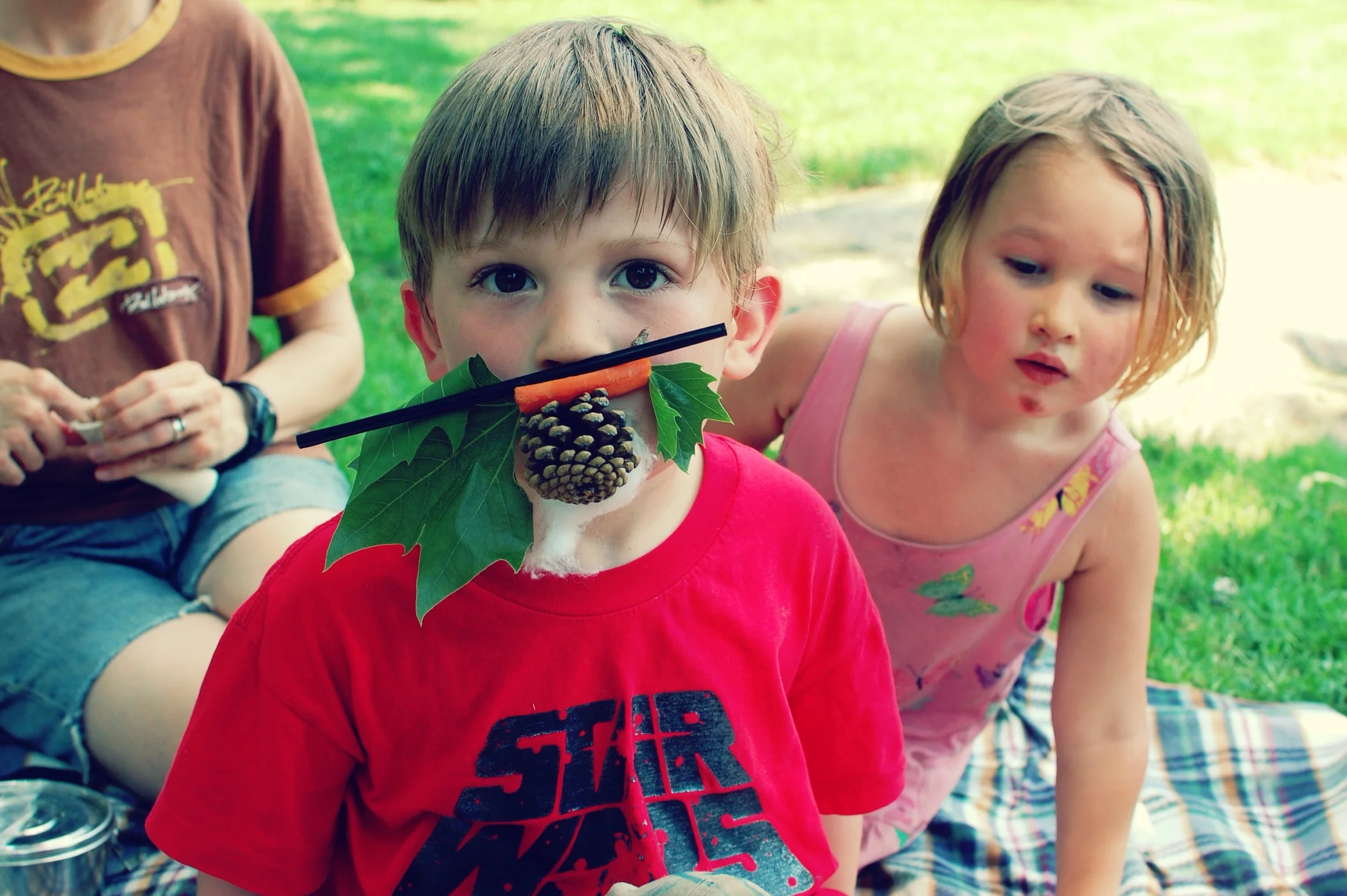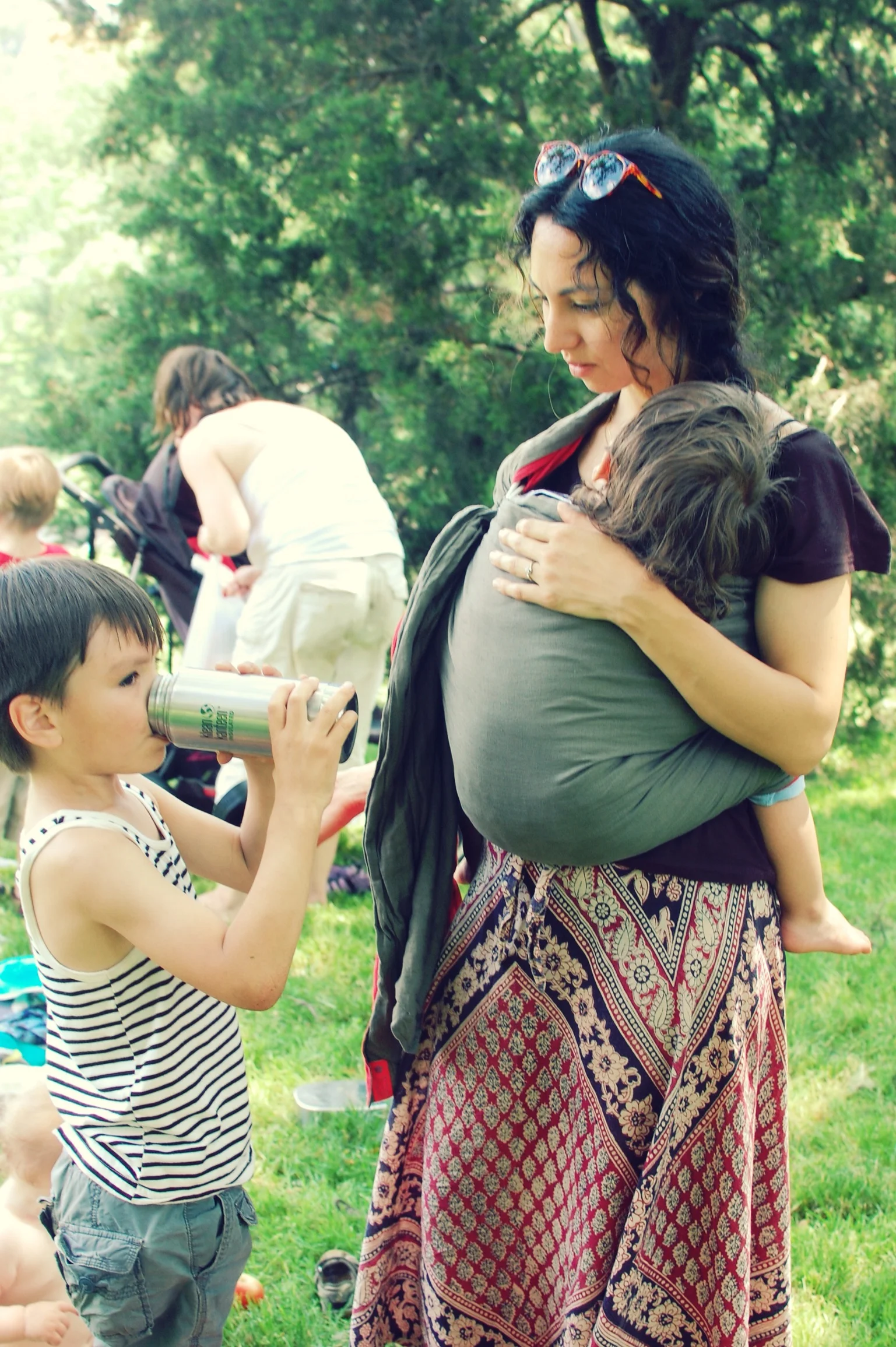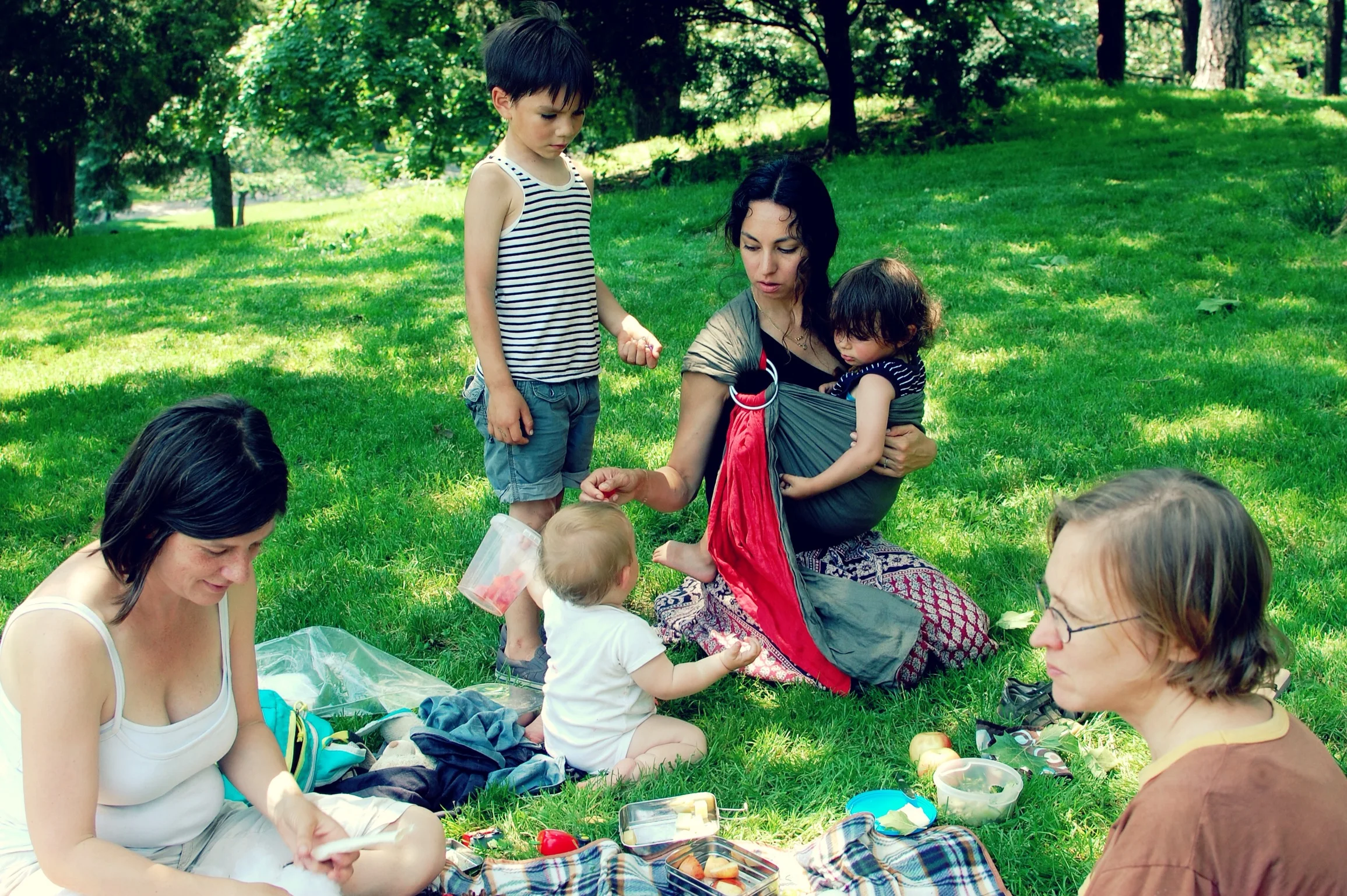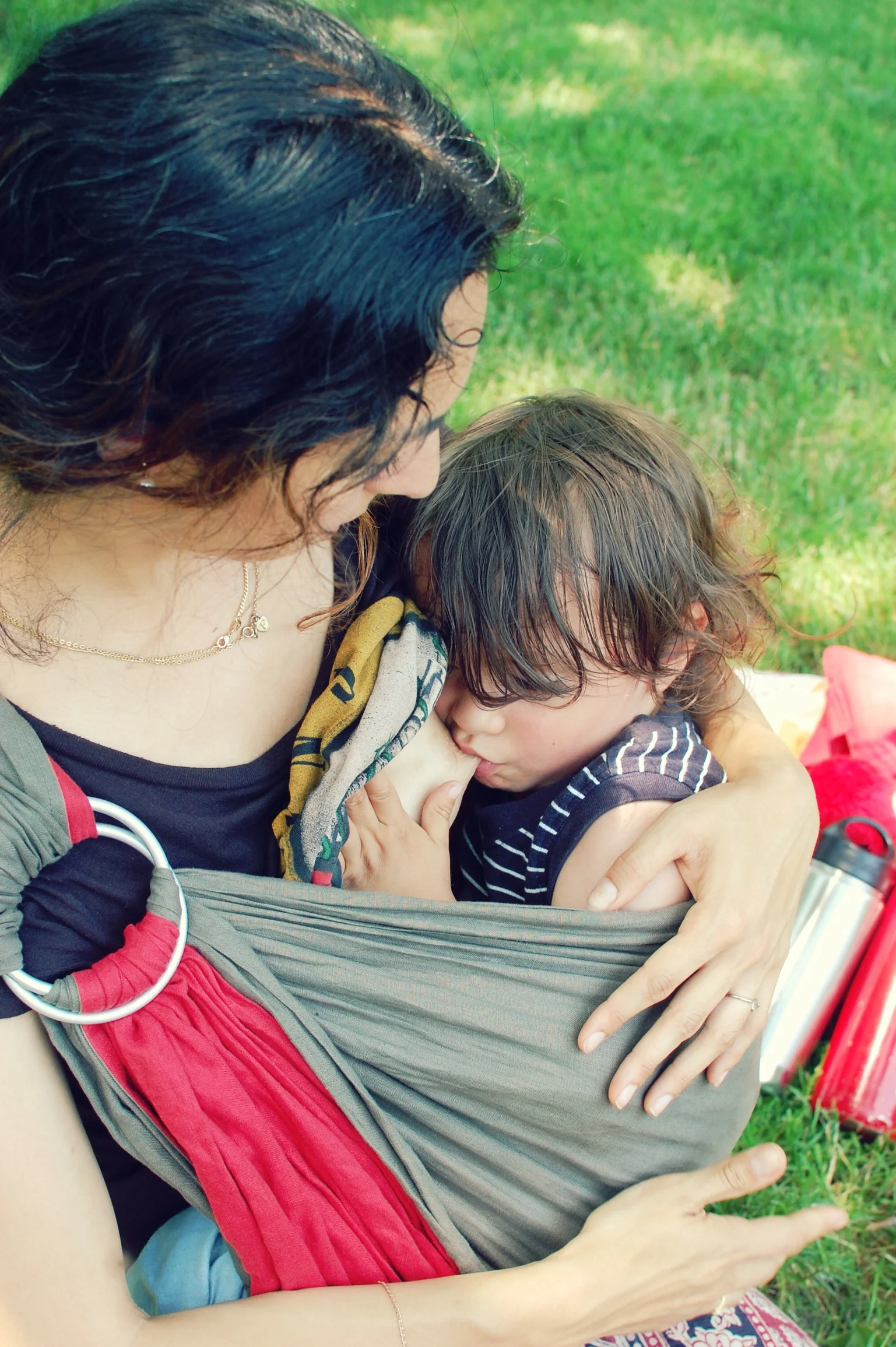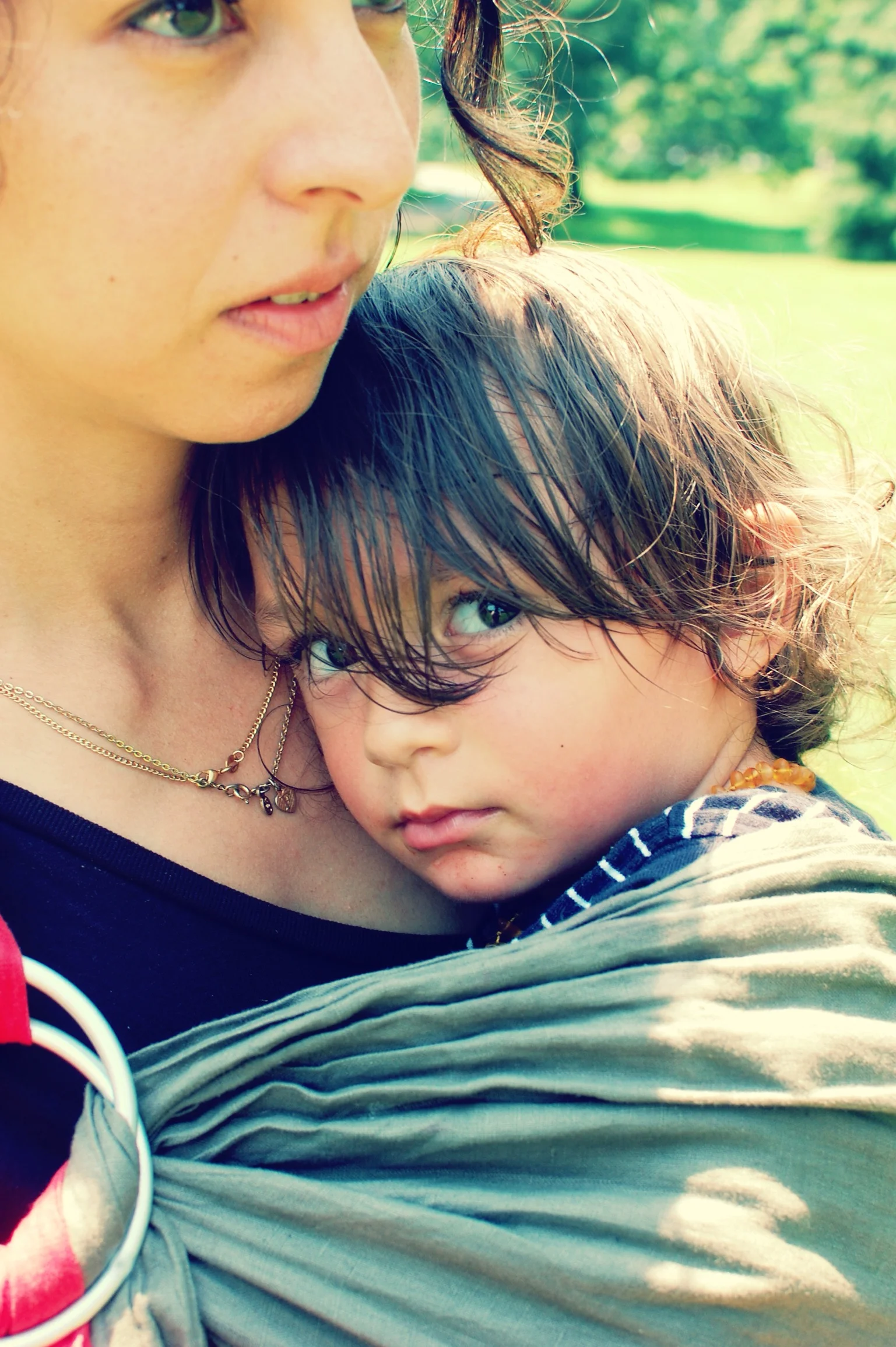KINSHIP
Gathering
In the mid-morning, the Central Park Forest Nursery assembles slowly, its members moving ahead of and trailing after each other. The families come from all boroughs, all points: Park Slope, Staten Island, Crown Heights, Chelsea, Harlem, Jackson Heights, Sunnyside, Williamsburg. Parents and children carry random assemblages of things in their bags - toys, crayons, books, diapers, a tree guide, sequins, a single sock. Some of us don't know how we even made it out of the house this morning. We all bring weird hippie snacks, and we share our food. Some days, none of us bring much food at all, each counting on eating everyone else's. On those days, we all go a little hungry.
The Forest Nursery
Early in the Fall of 2011, the poet Lisa Jarnot and her then 2-year-old daughter, Bea, found themselves invited out of a Waldorf-inspired forest kindergarten group because Bea refused to wear a sweater. (Some strict Waldorfians feel that it is crucial that children wear a specific, non-negotiable number of layers of clothing.) Lisa writes: "I was heartbroken, so two weeks later, we were back in the park with a new group that I had gathered through queries to local attachment parenting and homeschooling listservs." That was the beginning of the Central Park Forest Nursery. There are now more than 50 families participating, with a core of 10 or so families who attend regularly. I first brought my sons Francisco and Seiji to Forest Nursery in September 2012, after I saw a notice in an unschooling listserv. We have met with the group almost every week since then.
Forest Nursery is a homeschooling group - we meet during the day on weekdays. It is also an unschooling group. To be an unschooler means rejecting not only compulsory schooling outside of the home, but also the regular imposition of any structured curriculum or lessons at all. So, NO to the three Rs, Readin-Ritin-Rithmetic. Indeed, to the unschooler, Reading, Writing, and Arithmetic don't even exist - not by themselves, anyway, not as independent "subjects" to be mastered at a predetermined pace in a predetermined order, for their own sake. When Forest Nursery meets - sometimes up to five days a week - in Central Park and other places around the city, our learning is guided by the children, the environment, each other.
Why I Unschool
I stumbled into unschooling. After weeks - months - of agonizing, I decided not to send my older son Francisco to the school at which he was registered to begin his kindergarten year. And then, somewhat contrary to my original intentions, I found myself not replacing school with any meaningfully school-like activities - instead, I found that we were just kicking around the city, taking walks, going to the movies, eating at cafes, running errands, wandering around museums, grocery shopping, and otherwise living our lives according to our day-to-day needs and desires. It came to me, eventually, that I needn’t do anything else. I was unschooling my children, and it felt completely right.
The unschooling life is, in many ways, a magical one. I love the feeling of spilling out into the park - into the city, into the world - together with my children, with no goal or destination so fixed that it can’t be changed. I love the feeling that we are actively shaping our own experiences, our own minds. It’s radical and it’s romantic: We are dropouts, visionaries, free spirits, commie bastards, pink down to our underwear. We are our own folk heroes. We practice what we preach. We are anti-authority, antinomian, anarchist. We believe in love. We are revolutionaries. We are Hons.
To those who might say that it sounds like I’m doing this in service of my own aesthetic vision, rather than according to what is best for my children, allow me to suggest that that is what everyone does - the mechanism is just less visible when the path it leads to is less unusual.
In any case, I am not alone in this endeavor. In the Forest Nursery, I am surrounded by fellow dreamers, and their voices inform mine, as follows.
Why We Unschool
“My son benefits from being outside a lot, which is something that school cannot provide. Also, I think creativity, confidence, and self-reliance are hindered by the school model of teacher/student, authority figure/subject, expert/novice. I don't want my son to learn to value ‘experts’ over his own inner voice. I wish for him to be able to develop his own learning style so that he is confident that his is a good mind and so that his curiosity is nourished. I agree, for instance, with unschooling's take on learning reading, and I would love for my son to figure out how to read on his own without formal instruction. If we can give him the space and time to do this, he will carry this sense of accomplishment with him in all areas of his life.” - Suzanne
“I don't want my daughter to think that the rat race is the best way - or ethical - and I feel like that starts in school with testing, schedules, curriculum, rules, etc. I'd like for her to learn what she desires to learn at her own pace. In my own experience, the things I know well are things I learned outside of or on the periphery of school settings.” - Lisa
“I want my children to play and be outside as much as possible. I want nature to define their early lives, and I want to keep them away from corporate, authoritarian environments for as long as I am able.” - Alisa
“I think there's such a thing as 'the will to curiosity' - a will to know that can either be nourished or diminished. Unschooling is built around that, and schooling builds over it. If the basic will to know can be nourished, then one's likely to arrive at virtually every subject taught at school one way or another - and more likely to retain it, too. I want my daughter to have determined as much of her life course as possible - life itself will do enough to challenge that without adding school to the obstacles - and to do the things most suited to her.” - Thomas
Unschooling Kinship
Contrary to popular belief (“how will your kids be socialized?”), connection, kinship, and society are at the heart of the homeschooling project - and this is even more the case with unschooling. Homeschooling in general and unschooling in particular correct our myopic and often patronizing focus on “the child” in isolation, guiding us to instead think in terms of the family, in terms of interlocking families. Without the prefabricated structures and relationships of conventional schooling (whether at school or at home), unschoolers have the imperative - and the freedom - to seek out and define their own tribes. Unschoolers must create the world anew, forging the connections necessary to nourish and sustain exploration, the safety net for the deliberate daily free-fall. In other words, unschooling demands active, creative kinship.
Forest Nursery Kinship
“I've lived in New York for almost twenty years and had never formed deep friendships here. After my daughter was born and during her first year, I felt even more certain that kinship was impossible. Most parenting networks I encountered were fairly traditional, and the parents were doing things a lot differently than we were. But when people started to come out to Forest Nursery, I suddenly found that I had not only deep friendships but actual kinships - if i think of ‘next of kin’ for my daughter it would have to be people in the group. Coming to the park in four seasons is a real commitment - to one's kids, to the other families, to nature, etc. What's come with it is a realization that those drawn to this approach and experience share an ethos regarding kindness to children and questioning of authority. Our Forest Nursery has become a huge emotional and intellectual resource for my family - equal to a traditional tight-knit extended family or tribal community.” - Lisa
“I believe in autodidacticism, but I do also believe in learning arising from a deliberate context, a built thing such as Forest Nursery, from which arises knowledge, support, love, and a sense that that the world is lit up with real people. As you know, the first thing non-unschoolers bring up is ‘socialization’ (whatever that is). The avenues of socialization offered by conventional schooling are, to my mind, stifling, pathetic, and narrow. Unschooling seems a much more desirable - and real, and mature - way to foster sympathy and negotiate the whole chaos of having relations with people in the world.” - Thomas
“Finding a community that is open to all kinds of ideas and ways of doing things is a very American ideal and a very real practice in Forest Nursery. It's liberating and inspiring to be around these families, and I feel lucky to be able to share our amazing young kids’ lives together. Often in life, you have the friends you just come across, whether through jobs, school, neighborhood, or some other chance obligation. In contrast, with Forest Nursery, we have all chosen to meet and share this important time in our lives together. We have chosen each other for our kids and for ourselves; our journey together is a conscious one.” - Suzanne
Journeying
Sometimes, Forest Nursery meetings are resplendent. We make things, and the children make believe, and we have enough food, and everyone cooperates. We could be photographs in a Waldorf catalogue. Other times, though, our meetings don’t look like much. Maybe only two families show. Maybe we stand around and shiver while the children jump in puddles for an hour and then we all go home. Maybe we sit on rocks and eat yogurt dispiritedly. Maybe the children are at impossible, unbridgeable odds. Either way, it doesn’t matter. Rain or shine, pretty or ugly, rise or fall, our project remains the same. We are journeying, and we are together, and our journey together is a conscious one.



